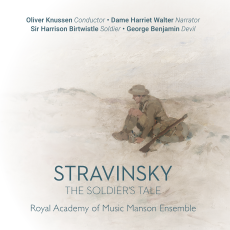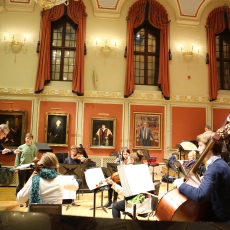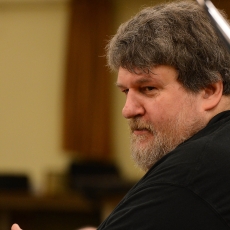Royal Academy of Music Manson Ensemble & Oliver Knussen - Stravinsky: The Soldier's Tale - MusicWeb International
In 1917 Stravinsky was living in Switzerland, cut off by the war from his family estate in Russia and from his royalties. The conductor Ernest Ansermet introduced him to the French-speaking Swiss writer Charles-Ferdinand Ramuz (1878-1947) and they decided to collaborate on a work which would be narrated, danced and played, based on a fairy story about a soldier and the devil from Afanasiev’s famous collection of Russian fairy tales. The soldier is persuaded by the devil to part with his violin in exchange for a magic book. He has various adventures including marrying a princess but eventually wishes to visit his home village. At the frontier he falls into the devil’s power. The score calls for three speaking parts: the narrator, the soldier and the devil, and, in addition there is a danced part for the devil. The instrumentation is for a septet: clarinet, bassoon, cornet, trombone, violin, double bass and a percussionist who plays a large battery. It was, in fact, an early example of music theatre, before that term had been invented. The first performance was a success but the musicians succumbed to the flu epidemic which was then sweeping Europe. Revivals were rare for some years but the work has now accepted as a masterpiece even though it is difficult to programme.
The music is quite superb, one of Stravinsky’s essential works, though there are of course many of these. It draws on his Russian past and the huge resources of his pre-war ballets but also looks forward to his neoclassical works for much smaller forces. He had also recently discovered ragtime and jazz and the result is that there is a zip and exuberance in the music which is quite irresistible. Because of the difficulties of staging the original, Stravinsky made a concert suite, and this is what is most usually heard. In another turn of fortune, this has itself been turned into a ballet, which I have seen and which works very well. (I have never seen the original staged, spoken and danced work.)
At this point enter the conductor Oliver Knussen and the Principal of the Royal Academy of Music in London Jonathan Freeman-Attwood. They cooked up a scheme for their students to mount a performance and recording of the original. They then had the startling idea that they would ask composers to play the parts of the soldier and the devil and managed to persuade Harrison Birtwistle and Peter Maxwell Davies respectively to take these parts. Maxwell Davies was unfortunately then in his last illness so the devil’s part was taken over by the younger composer George Benjamin. The narration was entrusted to the safe hands of Harriet Walter. The English version used is uncredited. To frame the work, short pieces by Stravinsky, Birtwistle and Maxwell Davies were chosen.
This works wonderfully well. Birtwistle’s fruity and lugubrious solder seems just the part and Benjamin’s wily devil would persuade anyone. Harriet Walter carries the story well, including the passages of melodrama where she has to speak over the music. I need to say that in the first part of the work there is more narration than music but in the second the proportions are reversed. With such a small ensemble every part is a solo part and the young players of the Royal Academy really revel in these and play with guts and a swagger which must be just what Stravinsky intended. Oliver Knussen does the honours from the podium with his customary skill.
The framing pieces are all very short. The three by Stravinsky himself come from his last years, when he came under the spell of Webern. They use serial technique but are unmistakable Stravinsky for all that. The two tribute pieces are sombre but the Fanfare, which opens the programme is, as Eric Walter White says, ‘like two pennants flying and crackling in a brisk wind’. Peter Maxwell Davies’ Canon ad honorem and Birtwistle’s Chorale were written to honour Stravinsky’s eightyfifth birthday. The two works which end the programme were each written in memory of him. The take longer to describe than to hear, but apart from the brass version of the Birtwistle Chorale, which sounds like Carl Ruggles’s Angels, they all sound very like Stravinsky despite coming very much from their own composer’s techniques and worlds. They are, in fact, effective tributes. Performances are assured, crisp and clean.


